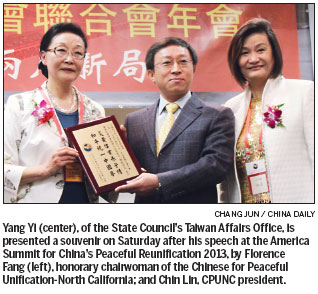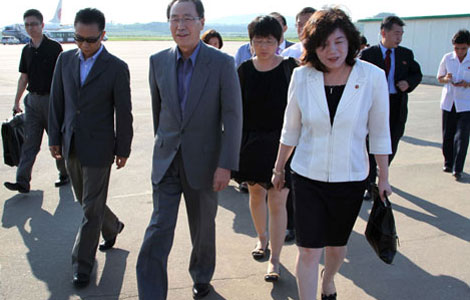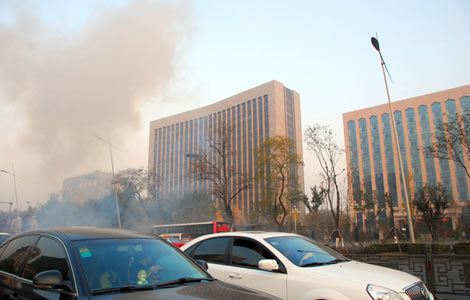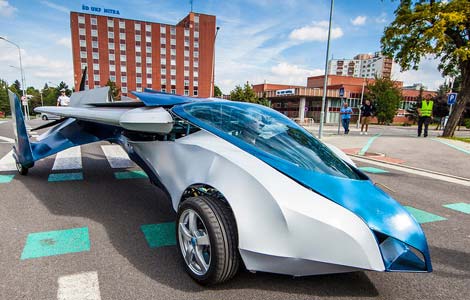Fresh new ideas urged on Taiwan issue
Updated: 2013-11-04 07:43
By CHANG JUN in San Francisco (China Daily USA)
|
||||||||

Around 300 people, including Chinese officials, scholars and advocates worldwide for peaceful reunification of China, put their heads together during a two-day summit brainstorming how to construct a breakthrough in the current Cross-Straits relationship between Beijing and Taipei.
Yang Yi, spokesperson for the State Council's Taiwan Affairs Office, leading a 12-member delegation from Beijing, shared his thoughts about peaceful reunification at the summit's theme of New Vision, New Concepts and New Actions.
Sponsored by Chinese for Peaceful Unification — Northern California (CPUNC), the America Summit for China's Peaceful Reunification 2013 kicked off Saturday, drawing delegates from across the world including Asia, South America, Africa and Australia.
Historical changes have been made in the past five years due to the Central Government's policies to further develop the Cross-Straits relationship, said Yang, admitting there are "historic sticky problems" left unattended.
The relationship between the two sides is a comprehensive system that includes politics, economy, culture and society, said Yang, who is upbeat about the current strong momentum of bilateral trade and travel across the 112-mile-wide Taiwan Straits.
To date, mainland authorities have approved 180 investment applications with $1 billion funding looking for opportunities in Taiwan. Each week, 670 direct flights shuttle back and forth across the Straits. And The Free Independent Traveler (FIT) program, which was initiated in June 2011 starting from Shanghai, Beijing and Xiamen, has now expanded to 26 cities. Residents of these cities are able to arrange independent travel plans to Taiwan without the burden of joining a tour group.
By the end of August, 300,000 Chinese mainlanders have visited Taiwan through the FIT program, a 23 percent increase compared to the same period of 2012, said Yang.
However, progress in political and security talks lag behind. For example, there is no concrete development regarding the pledge to set up representative offices in Beijing and Taipei or the questions over what authorities those office would have.
"Like it or not, the political agenda exists objectively," said Yang. "We need to face it sooner or later. We can start with economics and then politics, but we can't go by economics alone and no politics at all; we can start with the easy things then move to the difficult stuff, but we can't take just the easy things and never touch the tough ones."
Yang cited the four proposals the General Secretary of the Central Committee of the Communist Party of China Xi Jinping has offered during Xi's meeting with the visiting Honorary Chairman of the Kuomingtang (KMT) Party Wu Po-hsiung on June 13, during which Xi called on people across the Taiwan Straits to make joint efforts in achieving the great rejuvenation of the Chinese nation.
Taiwan leader Ma Ying-jeou reiterated that the KMT would not promote "Taiwan independence, One China, One Taiwan, or Two Chinas" before sending the delegation to Beijing.
In his four proposals, Xi emphasized the two sides should take the overall interests of the Chinese nation into consideration and safeguard national territorial integrity and sovereignty within the one-China framework; discard outdated concepts that don't suit the current situations; enhance mutual trust, engage in favorable interactions, seek common ground and shelve differences, be pragmatic and enterprising; and steadily promote the overall development of Cross-Straits ties.
"He who has no anxious thoughts for the future will find trouble right at hand," said Yang, quoting an old Chinese proverb. "We two sides should start with easy things, proceed step by step, avoid sensitive issues, and reach a consensus on issues that can be solved at the present stage," he said.
"We are willing to join hands with all walks of life in Taiwan on the basis of continuing to oppose ‘Taiwan independence' and upholding the ‘1992 consensus,'" Yang said.
"That's why we called upon our delegates to contribute their new vision and new concepts and take new actions," said Chin Lin, president of CPUNC. "We need to be united."
In addition, attendees voiced their opinions on US involvement and interference in China's domestic issues. Perceived as casting a shadow over the Cross-Straits relationship, the US has been playing a big role in complicating the situation, most recently in its anti-submarine aircraft sales to Taiwan in late September.
Lu Kang, minister at China's Embassy to the US, reiterated that Taiwan remains the most sensitive and most important core issue in the US-China relationship. He urged the US government to honor the One China Policy and the principles enshrined in the three Joint Communiqués for a positive and constructive China-US relationship.
"Looking back at history, we regret to see that for many years, the Taiwan issue has been a liability in China-US relations that undermines mutual trust and disrupts cooperation," said Lu.
"However, if the US can go along with the prevailing trend of a peaceful development of Cross-Straits relations, and genuinely appreciate and respect China's efforts to oppose separation and achieve peaceful reunification, the issue, instead of a liability and negative factor in our relationship, will be turned into an asset and a positive factor," Lu added.
Chien Han-Sun, representative from Taiwan's overseas Chinese community, urged the many organizations of overseas Chinese in the US and across the Taiwan Straits work closely as a same-root group. "If the private and grassroots organizations from both sides need to be forerunners in this course, let's take the action and do it," Chien said.
Gradual integration will ultimately lead to reunification, as the Cross-Straits relationship has been better than ever in the past five years, Chien said, adding that Taiwan would not need the US to sell it arms in the future as the possibility of reunification by force is zero.
"Our fortune is hard earned. Why we should waste our money buying refurbished arms from the US?" asked Chien.
junechang@chinadailyusa.com
Most Viewed
Editor's Picks

|

|

|

|

|

|
Today's Top News
Sex education cartoon an instant online hit
U. Michigan gets grant for China center
China's increasing role in global nuclear power
Panda cub drawing votes for her name
Firm breaks ground for new Suzhou facility
Program improves bone health in elderly Asians
World to see boom in big firms
Lead author of Obamacare law blames govt for rollout
US Weekly

|

|















